Collections and schedules
The City of Vaudreuil-Dorion offers several collections to its citizens in order to dispose of their residual materials in a responsible manner.
Search by adress
For all the information regarding your residence (such as your sector), use the Search by address.
2025 Collection Schedule
To avoid confusion with districts, the alphabet is now used to name sectors. Sector 1 has become A, 2, B and so on.
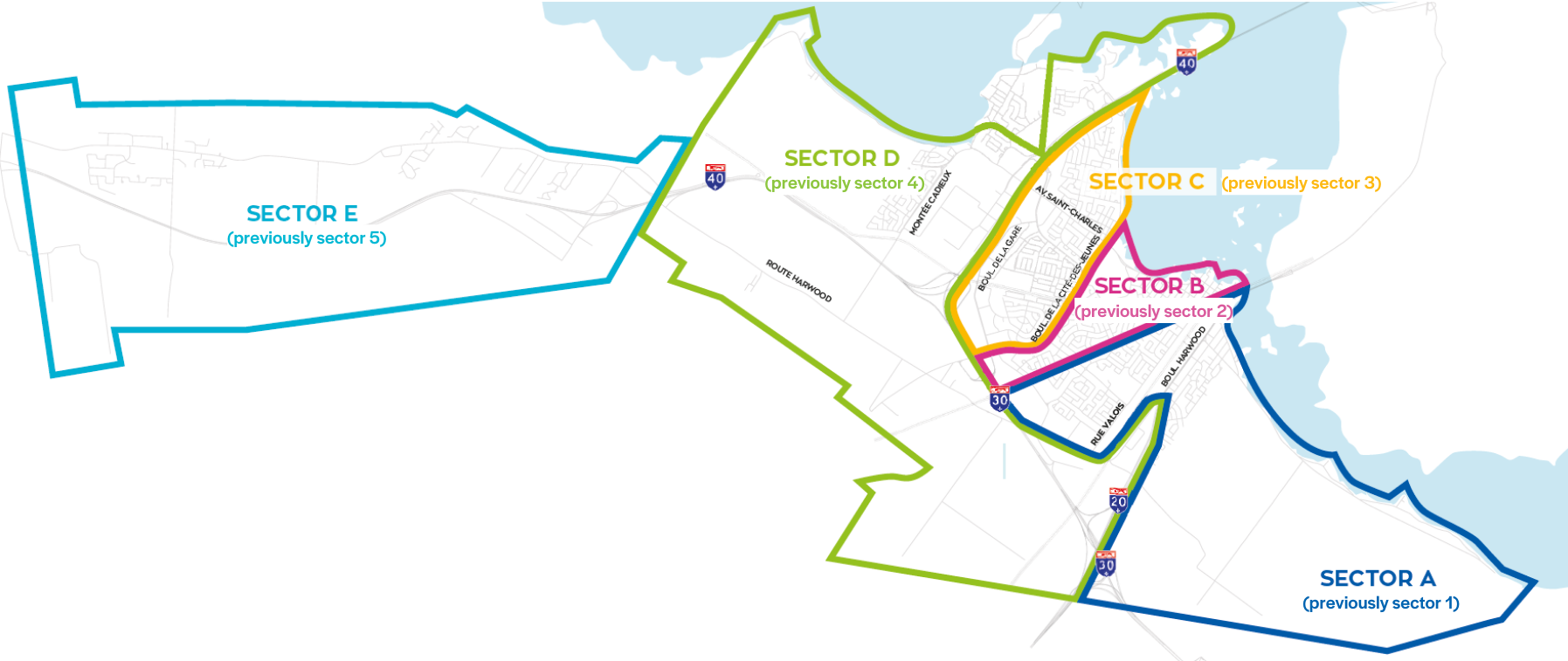
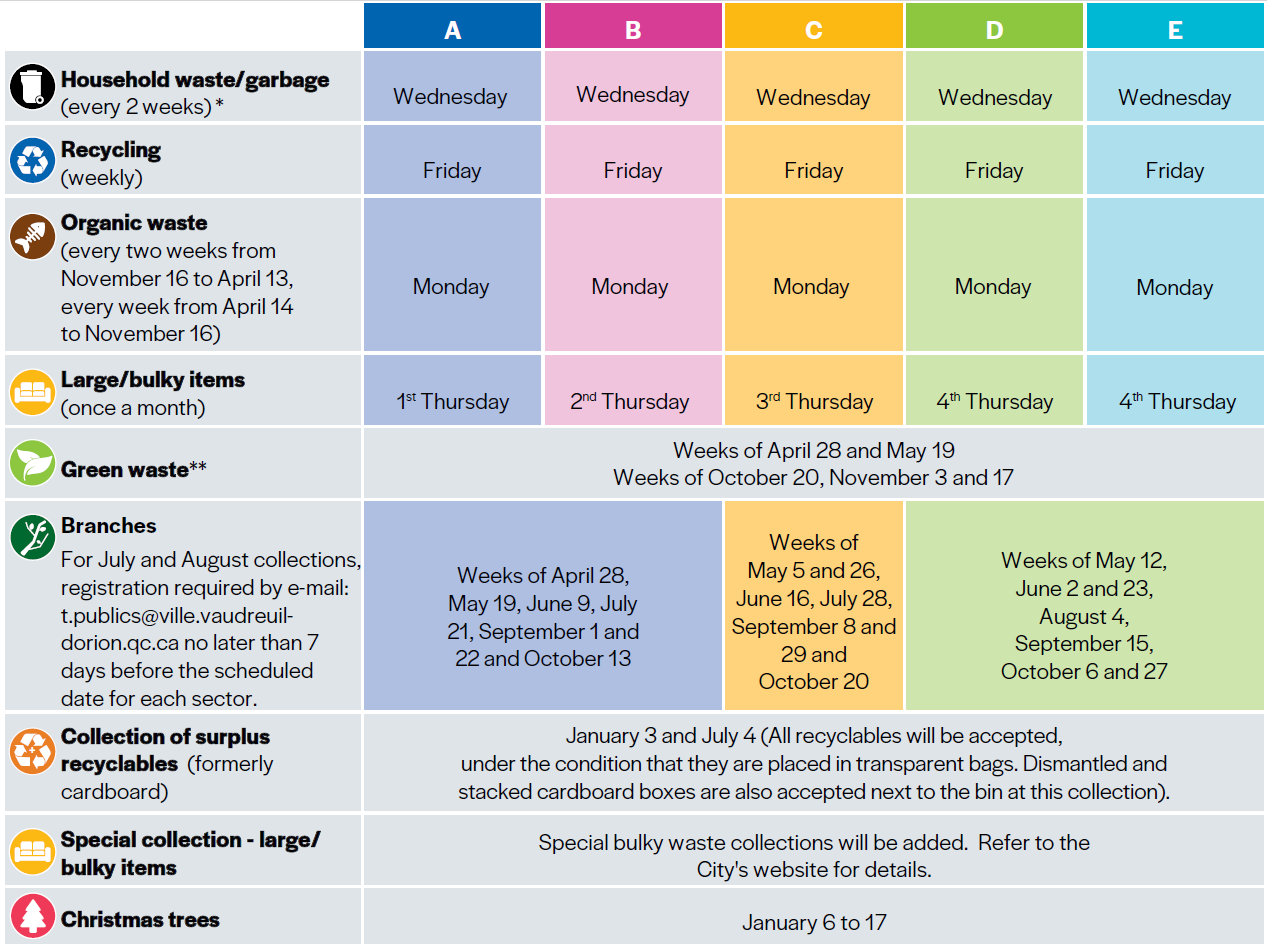
* For all residences, with some exceptions.
** As green waste is now accepted in the brown bin, only two green waste collections have been retained in the spring and three in the fall.
Tools to help you sort
Here is a list of different tools to facilitate responsible waste management:
- Recyclers' directory
- Tricycle: tool developed by the MRC of Vaudreuil-Soulanges that provides a list of possible disposal sites for different materials
- Web page of the écocentre construction waste: for a list of construction, renovation and demolition waste collectors in the region
- If the items are still in good condition, it is possible to participate in the City of Vaudreuil-Dorion's treasure hunts, which are scheduled in May and September of each year, or to donate them or sell them on the classified ads.
- Reuse Directory of the Quebec Zero Waste Association
- Ça va où ? Application: mobile application, developed by Recyc-Québec, to quickly visualize the location of the nearest drop-off points and ecocentres
Charter of materials accepted in collections
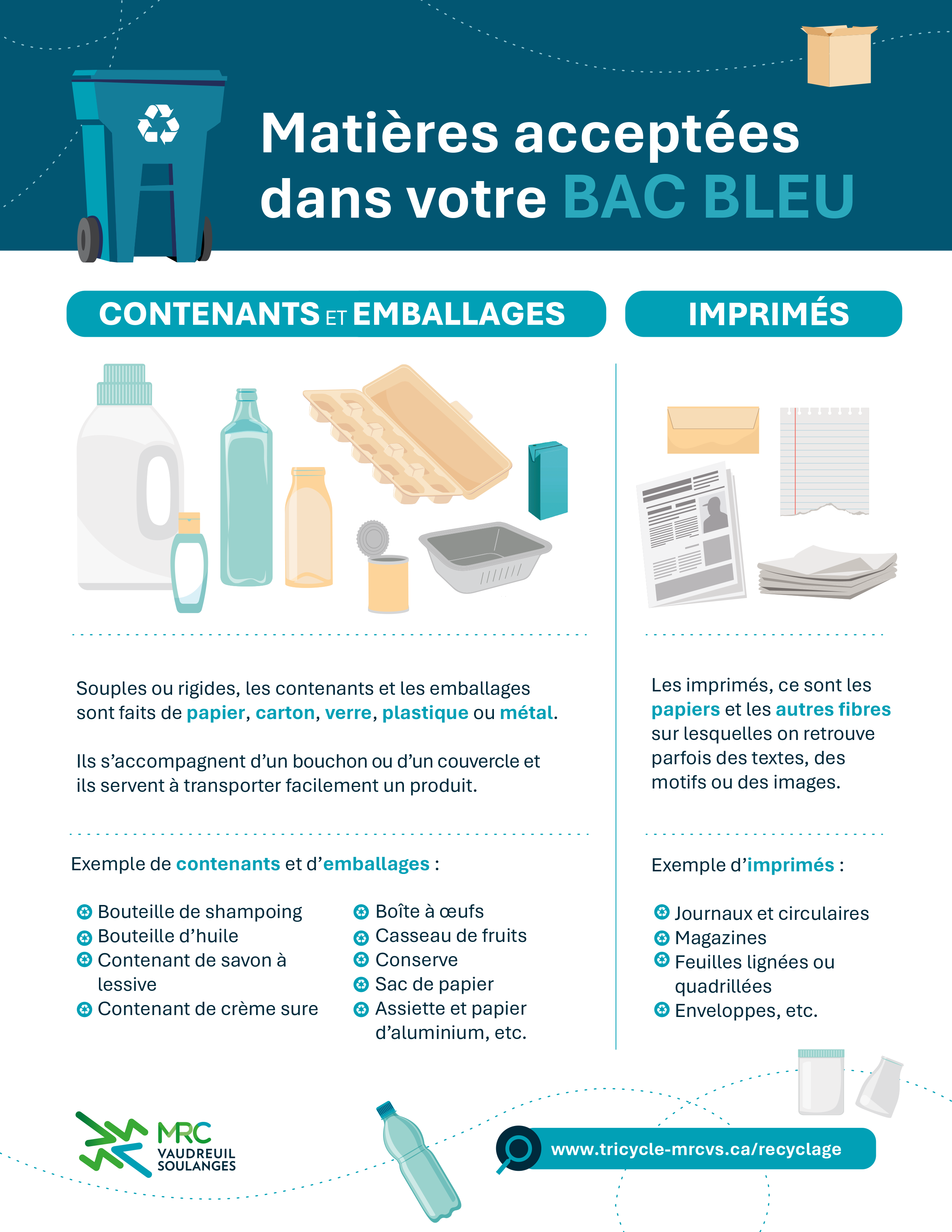
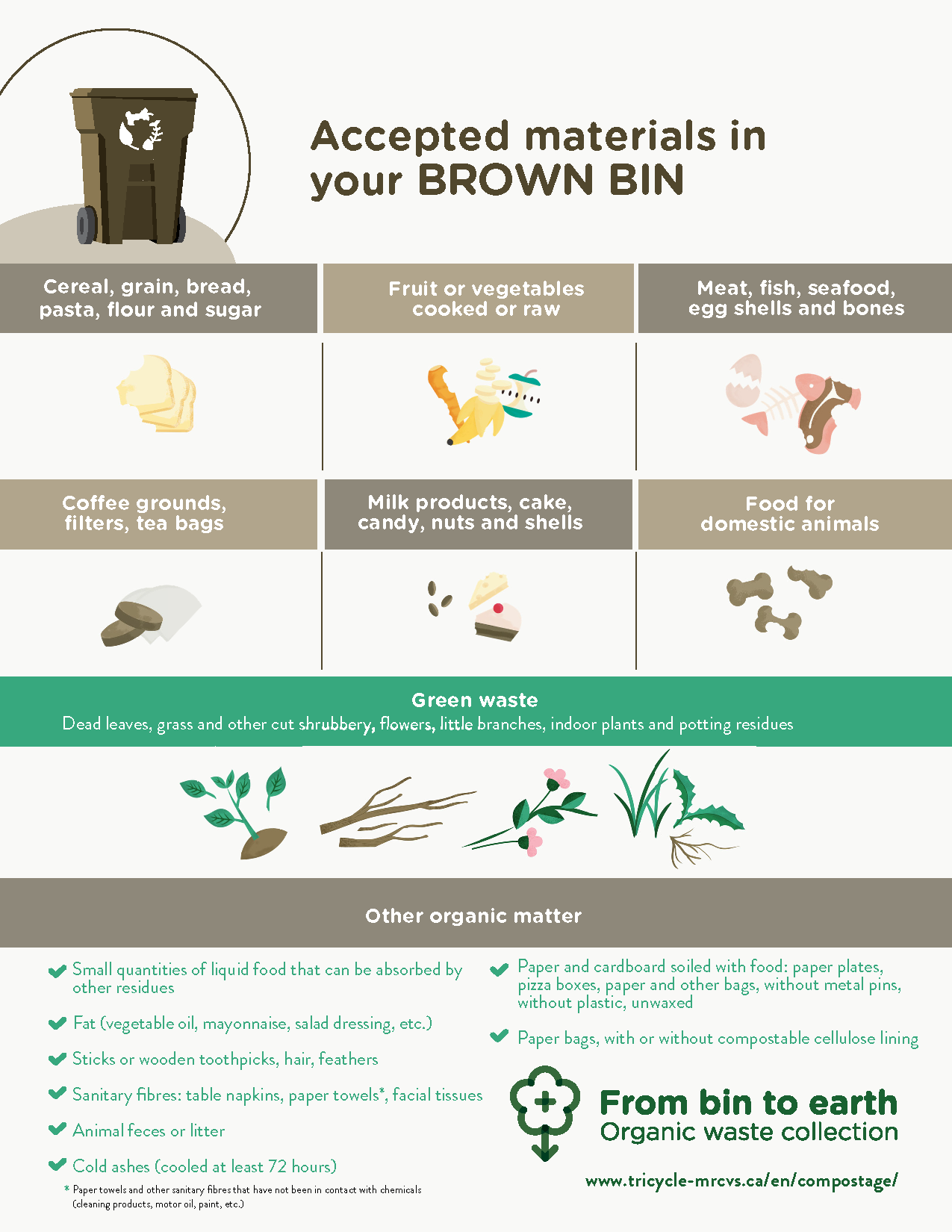
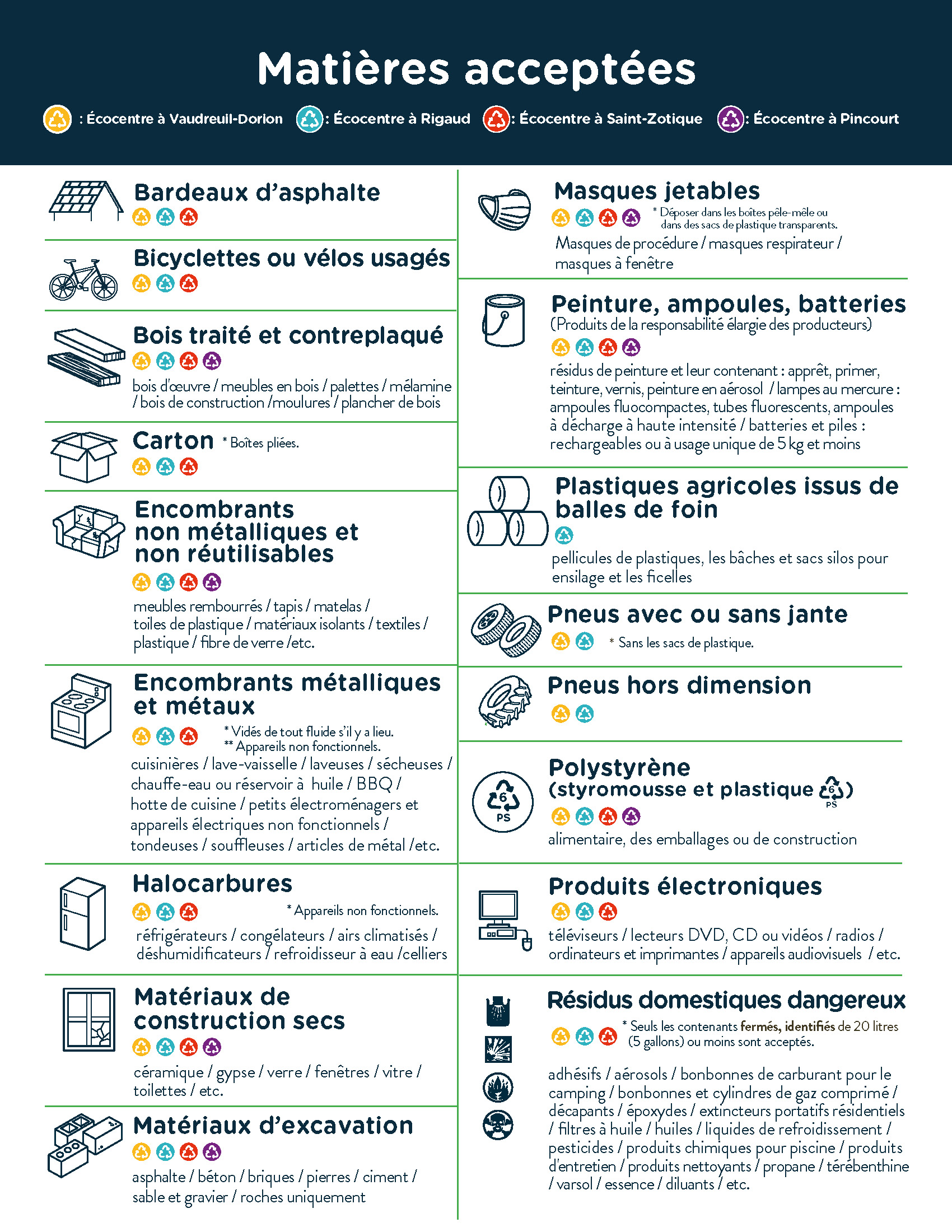
Domestic waste
Household waste collection takes place on Wednesdays for all sectors served by wheeled bins. The frequency of garbage collection is every two weeks for the entire residential sector. Consult the 2025 municipal calendar for exact dates.
The wheeled bins are the property of the City. Each one has a serial number associated with an address. They must therefore not be interchanged with neighbors' bins, since waste collection is part of the Smart Collection project.
Be sure to place your wheeled bin at the curb before 7 a.m. on the collection day or the night before. No bags left outside the wheeled bins will be collected.
To learn more, consult our Frequently asked questions.
Refused materials
- Hydrofluoric acid
- Asbestos
- Firearms and ammunition, explosives
- Branches, stumps and logs, Christmas trees
- Cyanide
- Biomedical and radioactive waste
- Signal fires and fireworks
- Recyclable materials
- Sharp items with no protection
- Products containing PCBs
- Food waste
- Construction, renovation and demolition waste
- Household hazardous waste (e.g. paints and solvents, pesticides, batteries, propane tanks, cleaning products, fluorescents and compact fluorescent light bulbs, etc.)
- Bulk waste
- Residues subject to voluntary disposal
- Information and communication technology waste (e.g. screens, computers, printers, etc.)
- Green and fall waste
- Soil
Where does the trash go?
All materials dropped off for garbage collection are sent to landfill.
Recycling
Recycling collection takes place every Friday in all sectors for units served by wheeled bins. Be sure to place your wheeled bin at the curb before 7:00 a.m. on the collection day or the night before. No bags left outside the wheeled bins will be collected.
Accepted materials
- Containers and packaging: Flexible or rigid, containers and packaging are made of paper, cardboard, glass, plastic or metal. They come with a cap or lid and are used to easily transport a product. Examples: shampoo bottle, oil bottle, laundry soap container, egg carton, fruit crate, can, paper bag, aluminum plate and foil, etc.
- Printed matter: Printed matter is paper and other fibers on which text, motifs or images can sometimes be found. Examples: newspapers and flyers, magazines, lined or squared sheets, envelopes, etc.
Recyclable materials cannot be contained and bundled in a plastic bag or other type of container. They must be placed in the bin as they are, in order to facilitate sorting during the recycling process.
For an item to be recyclable, you must be able to answer “yes” to these two questions:
- Is what you want to put in your blue bin a container, packaging or printed matter?
- Is it made of paper, cardboard, plastic, glass or metal?
If you're not sure, consult Tricycle, a tool to help you sort your residual materials.
What happens to recycled materials?
As of January 2017, all recyclable materials in the MRC de Vaudreuil-Soulanges are sent to the Tricentris sorting centre in Lachute.
Visit the site of this non-profit organization to discover the journey taken by your recyclable materials and to find out what products they're used to make.
Organic materials
Organics collection takes place on Mondays every two weeks during the winter season (mid-November to mid-April each year) for units served by wheeled bins. In 2025, bi-weekly collections will take place from November 16 to April 13, and will resume on a weekly basis from April 14 to November 16. For exact dates, consult the 2025 municipal calendar.
The wheeled bins are the property of the City. Each one has a serial number associated with an address. They must therefore not be interchanged with neighbors' bins, since organics waste collection is part of the Smart Collection project.
Materials accepted
Food waste
- Cereals, grains, bread, pasta, flour and sugar
- Fruits and vegetables, cooked or raw
- Meat, fish, seafood, eggshells and bones
- Coffee grounds and filters, tea bags
- Dairy products, cakes, pastries, nuts, husks
- Pet food
- Fats (vegetable oil, mayonnaise, salad dressing, etc.)
Green waste
- Conifer needles
- Branches and roots under 1 cm in diameter
- Bark
- Flowers and houseplants
- Herbs, grass, leaves, weeds
- Hedge trimmings
- Sawdust and wood shavings that are not treated, painted or stained
- Small quantities of potting soil and peat
- Vines (less than 1 cm in diameter and less than 60 cm in length)
Other organic materials
- Small quantities of liquid food that can be absorbed by other waste
- Wooden toothpicks or sticks, hair, feathers
- Absorbent fibres: napkins, paper towels, facial tissues
- Food-soiled paper and cardboard (without stickers, metal or plastic pins): paper plates, pizza boxes, chicken boxes, paper bags, etc.
- Paper bags*, with or without compostable cellulose film inside (e.g. paper grocery bags)
- Cold ashes
- Animal feces and pet litter
*The paper bags accepted in the collection are sold in most big box stores, grocery stores and hardware stores. However, biodegradable or compostable plastic bags sold in these same stores are not eligible for collection in Vaudreuil-Dorion.
Materials refused
Undesirable materials that are refused:
- Plastic bags (regular, biodegradable, compostable or oxo-degradable)
- Compostable plastic tableware
- Dead animals or parts of animals (e.g. deer heads and legs)
- Diapers, sanitary napkins and tampons
- Rock, gravel
- Corks
Non-compostable or contaminated waste
- Containers and packaging made of waxed cardboard or composite materials (multi-layers with cardboard, aluminum and plastic inside, e.g. Tetra Pak)
- Sanitary fibers (paper towels, etc.) that have been in contact with chemicals
- Dryer sheets or fabric softeners
- Dental floss, ear picks, make-up remover pads, wet wipes
- Candles
- Vacuum cleaner bags and contents
- Medicines and biomedical waste
- Construction, renovation and demolition waste
- Recyclable materials: plastics, glass, metals, textiles, fibers (except paper and cardboard for packaging food waste)
- Electronic items
- Household hazardous waste: oils, paints, pesticides, gasoline, batteries, treated, painted or stained wood
Where are the materials sent for organic waste collection?
All materials deposited in the brown bin are sent to a composting site.
Tips and tricks
How to keep flies away and avoid the development of maggots?
- Pack residues in newsprint or paper bags as much as possible.
- Maggots are the larvae of flies. Quickly closing the lid of the bin prevents flies from entering and laying eggs.
- Place the bin in a shady spot.
- Freeze meat residues and place them in the bin shortly before collection.
- If maggots are present, rinse the empty bin with boiling water to remove them.
How to keep animals at bay?
- Spray the bin with a mixture of hot sauce (e.g. Tabasco), water and dish soap.
- Coat the bin with a layer of decongestant (e.g. Vicks).
- Place an owl or fox sculpture near the bin, or a light with a motion detector.
How to eliminate odors?
- Pack food residues in newsprint or paper bags.
- Line the bottom of the bin with newsprint.
- Sprinkle food with baking soda.
- Freeze the residues and place them in the bin shortly before collection.
- Place the brown bin in a shady spot.
- When the bin is empty, rinse it with a solution of water, vinegar and baking soda every now and then.
Green waste
As green residues are now accepted in the brown bin, only five green residue collections will be held between April 28 and November 21. They will take place during the following weeks:
- Spring: weeks of April 28 and May 19
- Fall: weeks of October 20, November 3 and 17
Be sure to place your green or fall waste at the curb before 7 a.m. on Monday morning. They will be picked up during the week.
Only paper bags and loose waste (e.g., in a large plastic bin, a garbage can other than a wheeled container) will be accepted. To facilitate collection, containers must not exceed 25 kg and 1 cubic meter and must be equipped with handles on each side. Green or fall waste cannot be placed at the curb more than five days prior to collection.
You can also leave your grass clippings and leaves on your lawn by practicing grass-cycling and leaf-cycling.
For more information on these practices, visit the Eco-friendly lawn and grass-cycling page.
Accepted materials
- Conifer needles
- Branches and roots under 1 cm in diameter
- Bark
- Flowers and houseplants
- Herbs, grass, leaves, weeds
- Hedge trimmings
- Sawdust and wood shavings that are not treated, painted or stained
- Small quantities of potting soil and peat
- Vines (less than 1 cm in diameter and less than 60 cm in length)
Refused materials
- All other organic materials such as food waste. These must be placed in the brown bin.
Where does the green and fall waste go?
All green and fall waste is sent to a composting site or to farmers.
Bulky waste
Bulky waste is collected once a month: every 1st Thursday of the month for sector A, every 2nd Thursday of the month for sector B, every 3rd Thursday of the month for sector C and every 4th Thursday of the month for sectors D and E, with some exceptions*. They can be left at the curb up to five days before collection and before 7 a.m. on collection day. No containers or bags may be used for bulky waste.
* Consult the 2025 municipal calendar for exact dates.
Accepted materials
- Sinks
- Showers
- Toilets
- Bathtubs
- Upholstered and non-upholstered furniture (not broken into pieces)
- Bed bases and mattresses
No other materials are accepted in the bulk waste collection.
What to do with unaccepted waste?
Consult the page Ecocentre and construction waste for all other bulk waste.
If the items are still in good condition, it is also possible to participate in the Vaudreuil-Dorion's treasure hunts, which are held in May and September of each year, or to donate them or sell them on classified ads.
Branches
Please note that it is not possible to bring branches to the municipal garage from November 15 to April 1.
Each year, three branch collections are held in the spring, one in the summer* and three in the fall. Collection dates vary by sector.
*For July and August collections, registration is required by e-mail to t.publics@ville.vaudreuil-dorion.qc.ca no later than seven days before the scheduled date for each sector.
Be sure to place your branches at the curb by 7 a.m. on Monday morning. Branches that are larger in diameter should be placed with the end facing the street. They must not be tied in bundles and their diameter must not exceed 10 cm (4 inches). Each occupancy unit may leave a pile of branches not exceeding 1.5 m in height and 4 m in length for collection.
2025 Collection Schedule
| Spring / Summer | ||||
|---|---|---|---|---|
| Sector | Collection 1 Week of |
Collection 2 Week of |
Collection 3 Week of |
Collection 4* Week of |
| A and B | April 28 | May 19 | June 9 | July 21 |
| C | May 5 | May 26 | June 16 | July 28 |
| D and E |
May 12 |
June 2 | June 23 | August 4 |
* For July and August collections, registration is required by e-mail to t.publics@ville.vaudreuil-dorion.qc.ca no later than seven days before the scheduled date for each sector. Collection dates vary by sector.
| Fall | |||
|---|---|---|---|
| Sector | Collection 1 Week of |
Collection 2 Week of |
Collection 3 Week of |
| A and B | September 1 | September 22 | October 13 |
| C | September 8 | September 29 | October 20 |
| D and E | September 15 | October 6 | October 27 |
Outside the collection dates, you may bring your branches to the municipal garage, from Monday to Friday, from 7:15 a.m. to 11:45 a.m. and from 12:30 p.m. to 3 p.m. This free service is available from April 1 to November 15, upon presentation of a citizen's card or proof of residence. Please note that this service is not available on statutory holidays.
Accepted materials
- Branches from work done by the citizen himself and not by a contractor
Refused materials
The following materials are not accepted for collection because they can damage the blades of the knives used to shred the branches.
- Roots
- Soil
- Vines
- Branches tied in bundles
If you hire a contractor to do tree pruning or felling, the contractor is responsible for picking up the trunk and branches.
What are these branches used for?
The City uses some of the wood chips in its landscaping, but most of the branches are sent to a tree nursery that uses it as mulch for its plantations.
Self-service wood chips
Citizens who wish to obtain wood chips can always do so by going to the self-service site located on Rang Saint-Antoine, at the entrance to the snow disposal site (Rue du Voiturier). These chips were generated during the various branch collections on the territory or following the felling and pruning of trees in the city.
Surplus recyclable materials
Two special recyclable collections will be carried out during the year 2025, on the same day as the recycling collection. All recyclables will be accepted, provided they are placed in transparent bags. Dismantled and stacked cardboard boxes are also accepted next to the bin at this collection.
For all sectors
- January 3, 2025
- July 4, 2025
Accepted materials
- Cardboard boxes disassembled and stacked together, either by inserting them into a single box or by using a string or ribbon, no larger than 1 m2 (if boxes are too large, they must be cut up)
- All recyclable materials in transparent bags
Fir trees
From January 6 to 17, 2025 the collection of natural fir trees will take place. These must be placed at the curb before January 6. In addition to this collection, they can be brought:
- to the Maison-Valois park (at the indicated place)
- at the municipal garage (205, Valois Street)
Accepted materials
- Natural trees without decoration (e.g. balls, lights, icicles, etc.)
Instructions
- Remove all decorations;
- Do not put the tree in a plastic bag;
- Place it with the base facing the street;
- Make sure it's not covered in snow or caught in ice.
Semi-buried containers
Several addresses are served by semi-buried containers. These containers are owned by the property and are shared between specific civic addresses. Only the civic addresses assigned to a semi-underground container can use it. Their repair and maintenance is therefore the responsibility of the owners. The collection days for the semi-buried containers vary according to the address and the type of material.
According to the municipal by-law, no material or bag can be deposited outside the semi-buried containers, except for green and fall waste, branches and bulk items.
Cardboard must be folded and cut up at all times before being placed inside the semi-underground containers, except during special cardboard collections when it can be placed next to the container.
Domestic composting
Citizens who want to compost at home can also do so. A subsidy is available for the purchase of a home composter or for the purchase of materials for its construction. Find out more before you start home composting to ensure the success of your project.
If you are composting at home, the following materials should not be included in your composting process to avoid health and odour hazards, and to ensure the success of your project:
- Dead animals
- Barbecue briquettes
- Wood ash and treated wood
- Animal feces, manure and slurry, septic tank sludge
- Fats (oil, salad dressing, frying)
- Dairy products
- Sick plants
- Sweeper dust
- Meat, bones, seafood and fish
Tips
Avoid placing your backyard composter near your neighbour's yard. If there are odours, it is because there is too much green waste, too much water or the mixture is too compact. If this is the case, add a layer of dry brown waste and mix the compost. If the odours are persistent, simply cover the waste with a layer of compost or soil.
Wheeled bins: instructions for use
- Roll-out bins must be placed 1 meter away from any object or obstacle that would prevent access to the roll-out bin during collection (e.g. car or construction) and at least 30 cm apart, with the wheels on the side of your residence. It is forbidden to place them on the sidewalk, in the street or on a bicycle path.
- In the case of multi-unit buildings, the bins can be placed perpendicular to the street, in the driveway if it is impossible to collect them at the curb because of snow (see image below).
- No one shall leave a wheeled bin in front of an occupancy unit more than one metre (1 m) from an occupancy unit or accessory building, except when the bin is in need of repair, replacement or when it is still to be collected.
- Wheeled bins must not interfere with snow removal or street cleaning.
- Wheeled bins are the property of the City. Each roll-out bin has a serial number associated with an address. They should therefore not be interchanged with those of the neighbors. The owner must write their address on the roll-out bin.
- No residue or bags of garbage shall be placed beside or on the wheeled bins and the lids shall be closed.
- Dusty residues or those that can easily be blown away during decanting should be placed in a bag before being placed in the bins.
- Failure to follow some of these instructions may result in the wheeled bin not being picked up and may result in fines under By-law 1792.
Repairing or replacing a wheeled bin
The City of Vaudreuil-Dorion offers a repair or replacement service for recycling, food waste and garbage bins. You wish to repair or replace a bin? Fill out the appropriate form on the Repair and replacement of wheeled bins page.
Uncollected bin
Your bin hasn't been emptied? There are a number of reasons why the contractor may not have picked it up:
- The bin was placed at the curb after the truck had passed (plan to place it before 7 a.m.);
- It's the wrong collection day (check the schedule);
- There is unauthorized waste in the bin (make sure you sort the materials properly).
- The bin is not positioned according to instructions (too far away, in the street, on a bike path or moved by the snowplow);
- An obstacle was near the bin (bins must be placed 1 metre away from any obstacle that would prevent access and collection);
- The bin was placed in the wrong direction (wheels must face away from the street);
- The bin is broken (request repairs).
- The bin lid is open and residue is sticking out;
- The bin does not belong to the City (logo);
- The bin weighs over 45 kg (360-litre bin) or over 40 kg (240-litre bin);
- The recyclables are in a plastic bag (they must be placed in the bulk bin);
- The organics bin contains plastic bags. These are not allowed, even if they are biodegradable or compostable;
- The bin is stuck in ice (it must be cleared of snow and ice, otherwise collection cannot take place);
- Residual materials deposited next to the wheeled bin, outside the special collection dates indicated in the municipal calendar;
- Situation presenting a safety hazard or breakdown of the unit served;
- The contents of the bin are icy.
If all these criteria have been met and your bin has not been emptied, contact the Public Works Department by e-mail or at 450 455-3371, ext. 2956 to report the oversight.
